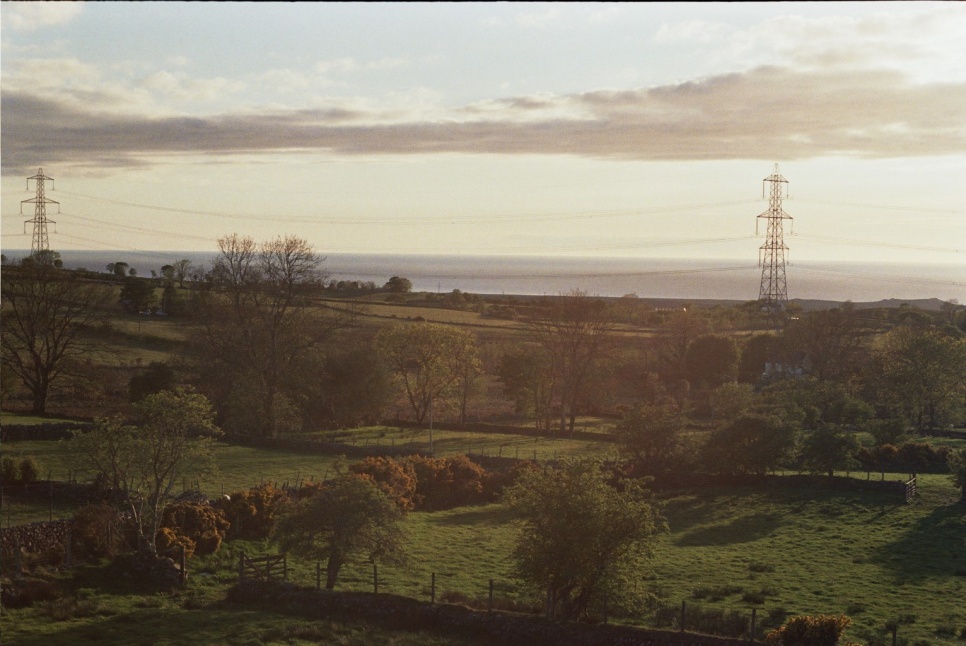Following on from our Forum in 2018, we invited the speakers and artists from the day to respond to the current situation – to see what has changed, and what can still be done.
Grug Muse is a poet, essayist and editor from Dyffryn Nantlle. She is currently finishing her thesis on Welsh Travel Literature at Swansea University. She is co-editor at Y Stamp magazine and publications, and her first collection, 'Ar Ddisberod' was published by Cyhoeddiadau Barddas in 2017. Here, Grug shares some of her experience of lockdown and connecting with others through our windows.
June
The screen freezes, and a clicking sound comes from somewhere. Outside my window, a sparrow has landed on the window sill. His nest is under the eaves, by the upper corner of the window, and he uses the sill as a sort of landing-place, somewhere to sit and take a break before plunging down into the garden beneath us.
The screen unfreezes, though the conversation remains jerky through the computer. The bird stretches his wing and scratches his belly, before jumping down, out of my sight.
On the screen, I’m in the middle of a discussion on translating poetry with poets from Wales, Serbia, Croatia and Greece. The internet comes and goes, a few of our cameras refuse to work, and the clicking sound is still there. But here we go, this is the new world.
Through my window, I catch a glimpse of my neighbour, M– in his red raincoat, emerging out of the door of his house. These days, he calls by everyday with a box of eggs, because the café in town that usually accepts them has closed temporarily, leaving him drowning in fresh eggs. It would appear that we’ve seen more of M– during the last six months than we’d seen of him during the previous twenty five years of being neighbours.
Someone asks a question about metaphor. I’m back in the virtual realm, somewhere between Zagreb and Merthyr Tudfil.
August
On the desk by my side is a slate coaster with the words ‘Clefar Clogs Covid-19’ etched into it. A souvenir from the weekly zoom quiz, which became an international phenomenon during the early months of lockdown. A souvenir, as if covid is somewhere you can visit, as if it’s over.
Today, I’m not sure where my phone is. It ran out of battery a few days ago, and I put it somewehere out of view, and it was wonderful to be disconnected for a few days after being so extremely connected during the last few months, always available, for every meeting, available, no such thing as work hours, available, nobody around, nowhere to go, available.
I was meant to spend August this year in Larissa, Greece as part of a Ulysses Shelter residency. Instead of that, I share notes with a translator over instagram, appeare in the Thessalist poetry festival in video form, swim at Dinas Dinlle, watch rain clouds slide over Sir Fôn.
September
A ‘haf bach Mihangel’* is upon us, and they are out, busy with the hay harvest, large tractors squeezing through narrow places, chugg-chugging heavily along the small lanes, their bright lamps casting light on the mountain in the night.
This area is seen to be a far-away place, but far from where? From Cardiff? Certainly. Dublin is closer, and easier to reach. If it came to that, on a clear night I can see the Wicklow hills from here, and, often enough, the RTE signal is stronger than Radio Cymru. Climbing the mountains, I have a chance of seeing the Blackpool lights, and the Isle of Man. I can be speaking with my cousin in Alaska, with my friend in Guatemala, with poets in Croatia, so long as I go back to the house, back to the wifi.
I watch the swallows fly past the house, plummet past the telegraph pole, turn around in a wide circular before darting back to the hedges. They will be leaving soon, travelling south. Another tractor clamours past the house. Yes, this area is a far-away place.
*A ‘haf bach Mihangel’, Michael’s little summer, is the Welsh name for an autumn heatwave.
Pwy sy’n siarad dros Gymru?
Mi a glywais fod yr hedydd
wedi marw ar y mynydd
ac er y gwn mai gwir y geiriau
does dim sôn am wŷr nac arfau
nac am y gwenwyn yn y caeau
na’r afonydd llawn cemegau
Ac mae 'na lai o adar yn yr ardd eleni,
llai heddiw na ddoe, mwy ddoe na fydd fory.
Ac er mod innau’n blentyn y naw degau,
slot meithrin, tamagochi,
tsiocled freddo am 10p,
‘di tyfu fyny’n chware dryga
ar y comin, nai gyfaddef
o ni’n ddau ddeg pedwar cyn gweld y gog,
ac yn y brifysgol cyn gweld draenog, yn y cnawd.
A ma’ na lai o adar yn yr ardd eleni,
llai heddiw na ddoe, mwy ddoe na fydd fory.
Ac ar ben moel Tryfan, brain a drain
a gwynt yn cribo’r gwallt yn ôl,
mae’r chwarel yn hafn ddofn
rhyngof fi, a’r Wyddfa.
Ac wrth i’r gwynt chwipio’r llais o fy ngwddw
welai ddim ond brain, a defaid.
Dwi’n fyd, yn deud dim byd,
yn clywed dim byd ond brain, a defaid.
A tasa Branwen yn fyw heddiw, yn gyrru
drudwy yn gennad, fysa’r drudwy yn cyrraedd?
A’i niferoedd wedi haneru
ers mil-naw-naw-deg-tri, pryd ges i ‘ngeni,
fysa’r ddrudwen fach yn nabod
gwlad o redfeydd awyrennau, priffyrdd,
a choedwigoedd pinwydd marwaidd?
Ac mae 'na lai o adar yn yr ardd eleni,
llai heddiw na ddoe, mwy ddoe na fydd fory.

